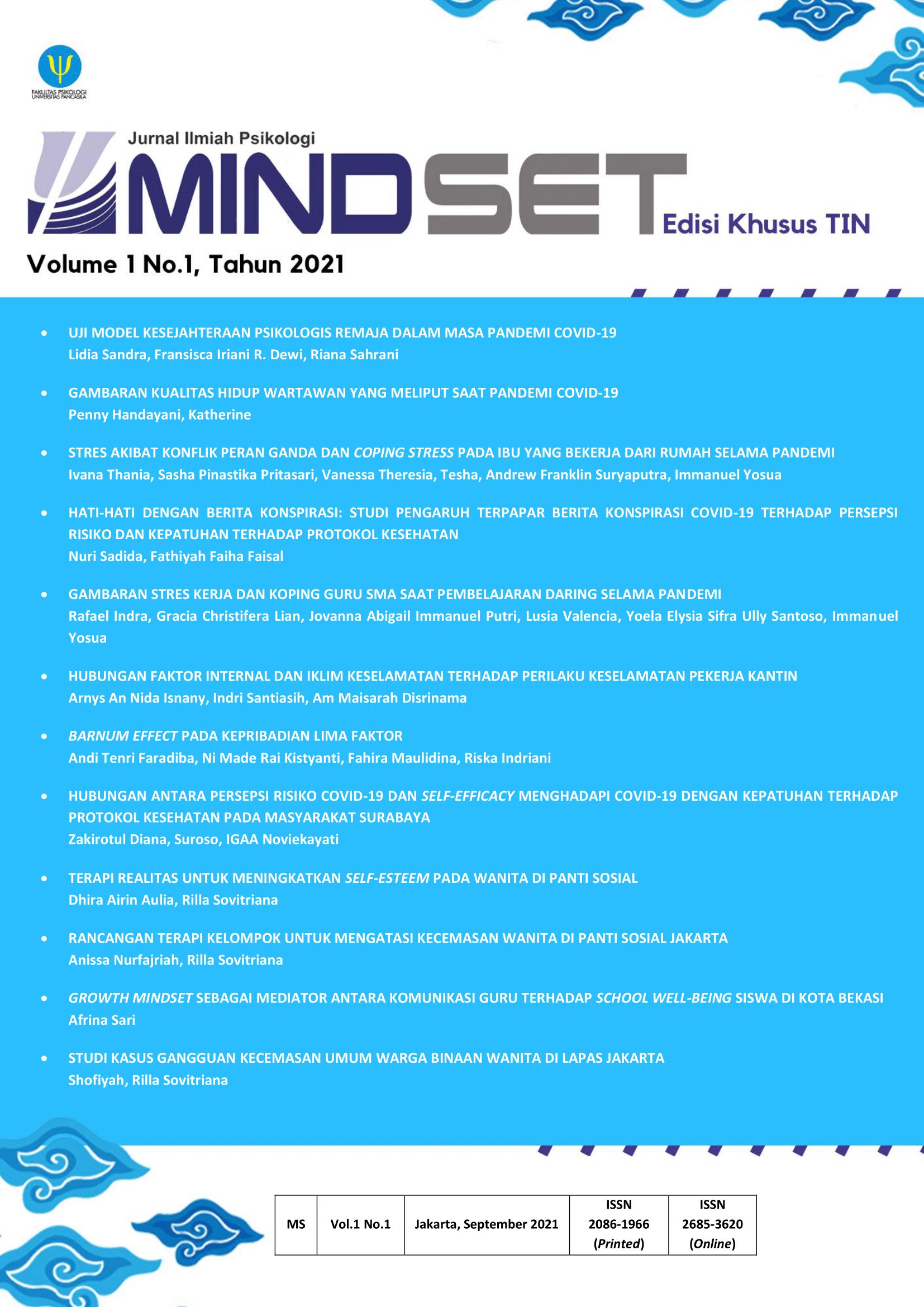Growth Mindset sebagai Mediator antara Komunikasi Guru terhadap School Well-Being Siswa di Kota Bekasi
Abstract views: 974 | PDF (Bahasa Indonesia) downloads: 1037
Abstract
School well-being is related to students' subjective assessment about their school. School well-being has four dimensions, having (school conditions), loving (school relationships), being (self-fulfillment), and health. School well-being will be felt better by students, if the teacher's communication is better done to students. And the growth mindset becomes a mediation for students that must be developed. This study aims to examine the mediator variable, growth mindset, which is a mediator between teacher communication affecting school well-being. The research method uses correlational quantitative methods. The population was 480 students, and sample was 214 students, which were taken based on Morgan's table. The results showed that there was a significant and positive effect at the level of p=0.05. Teacher's communication on school well-being with a growth mindset as a mediator shows the Sobel test score of 2.207, and can be interpreted that the growth mindset is feasible as a mediator.
References
Azwar, S. (2013). Penyusunan Skala Psikologi. Yokyakarta: Pustaka Belajar.
Blackwell, L., Trzesniewski, K., & Dweck, C.S. (2007). Implicit theories of intelligence predict achievement across an adolescent transition: A longitudinal study and an intervention. Child Development, 78, 246-263.
Chrisantiana, T. G., & Sembiring, T. (2017). Pengaruh growth and fixed mindset terhadap grit pada mahasiswa Fakultas Psikologi universitas “X” Bandung. Humanities (Jurnal Psikologi), 1(2), 133-146. Htpps://doi.org/10.28932/humanitas.vli2.422.
Firmanila, F., & Sawitri, D. R. (2015). Hubungan antara efikasi diri akademik dengan school well-being pada siswa SMP Hang Tuah 1 Jakarta. Jurnal Empati, 4(2), 214-218.
Inah, E. N. (2015). Peran komunikasi dalam interaksi guru dan siswa. Jurnal Al-Ta’dib, 8(2), 150-167.
Kartasasmita. (2017). Hubungan antara school well-being dengan rumination. Jurnal Muara Ilmu Sosial, Humaniora, dan Seni, 1(1), 248-252.
Konu, A., & Rimpelä, M. (2002). Well-being in schools: A conceptual model. Health Promotion International, 17(1), 79-87. https://doi.org/10.1093/heapro/17.1.79
Liu, W., Tian, L., Huebner, E. S., Zheng, X., & Li, Z. (2015). Preliminary development of the elementary school students’ subjective well-being in school scale. Social Indicators Research, 120(3), 917-937.
Na’imah, T., & Pamujo. (2014). School well-being pada anak didik di taman kanak kanak. Sainteks, 11(2), 1-5.
Rohman, I. H., & Fauziah, N. (2016). Hubungan antara adversty intelligence dengan school well-being (Studi pada Siswa SMA Kesatrian 1 Semarang). Jurnal Empati, 5(April), 322-326.
Saunders, R. (2014). Effectiveness of research-based teacher professional development. Australian Journal of Teacher Education, 39(4). http://dx.doi.org/10.14221/ajte.2014v39n4.10
Papalia, D. E., Old, S. W., & Feldman, R. D. (2008). Human Development (Psikologi Perkembangan). Jakarta: Kencana.
Sawitri, N. (2017). Memberikan pujian yang tepat menurut growth mindset. Jurnal Adi WIDYA: Jurnal Pendidikan Dasar, 2(2), 50-54.
Tian, L., Tian, Q., & Huebner, E. S. (2016). School-related social support and adolescents’school-related subjective well-being: The mediating role of basic psychological needs satisfaction at school. Social Indicators Research, 128(1), 105-129.
Wahidah F. R., & Royanto L. R. M. (2019). Peran kegigihan dalam hubungan growth mindset dan school well being siswa sekolah menengah. Jurnal Psikologi Talenta, 4(2), 134-144. https://doi.org/10.26858/talenta.v4i2.7618
Wijayanti, P. A. K., & Sulistiobudi, R. A. (2017). School management as one of key factors to develop elementary school students' well-being. Proceeding Book of The 6th Asian Psychological Association Convention (pp. 162-172). Malang: Fakultas Pendidikan Psikologi Universitas Negeri Malang.
Zeng, G., Hou. H., & Peng, K. (2016). Effect of growth mindset on scholl engagement and psychological well-being of Chinese primary and middle school students: The Mediating role of resilience. Frontiers in Psychology, 7, 1873. https://doi.org/10.3389/fpsyg,2016.01873.









